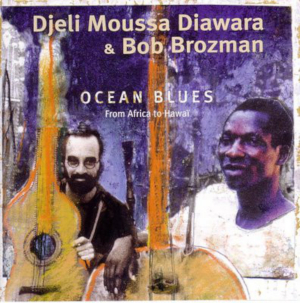Djeli Moussa Diawara & Bob Brozman (Guinea/USA)
Ocean Blues (2000)
11 tracks, 56 minutes
YouTube playlist
As well as being one of the most accomplished slide guitarists in the blues and Hawaiian idioms, Bob Brozman was also a master collaborator. In his career, he released successful albums with musicians from around the world, such as the Tau Moe family (Samoa/Hawaii), Takashi Hirayasu (Okinawa), René Lecaille (La Réunion) and Debashish Bhattacharya (India), always bringing his command of the slide into respectful and equal meetings with his co-performers. Ocean Blues marked the first time he had recorded a collaboration outside of the blues and Hawaiian music spheres, with the famed Guinean kora player Djeli Moussa Diawara.
Considering the sheer number of collaborations between blues musicians and West African musicians that are available these days, it is impressive that Ocean Blues still holds up as one of the best. I think it’s because it isn’t trying to force something that doesn’t have to be there; Diawara and Brozman are not looking to find a perfect mid-point between their respective styles that harks back to a time when the blues was an African music. Instead, they know what they’re good at and that’s what they play: some are traditional Mandé kora pieces, some are blueses and some are from different traditions altogether, bringing in Spanish, Arabic, Mexican or Hawaiian influences; there’s even a beautiful version of the Swahili song ‘Malaika’.
That said, my favourite pieces on the album are actually the two that bring the most blues into their sound, ‘Maloyan Devil’ and ‘Uncle Joe’. The former is based on the Skip James classic ‘Devil Got My Woman’ and the latter was made famous by the calypso singer Wilmoth Houdini, who recorded the piece in 1945. Both of these pieces show the best of the instrumental prowesses of Diawara and Brozman, with multiple exciting solos each, the intricate kora runs melding perfectly with silky slides. Come to think of it, both of these songs are mostly based on the minor I-V7-I chord progression. It’s possibly the most basic chord pattern there is, but it’s also the most effective – it is literally just wave after wave of tension and release. No wonder it’s so good for jamming on; I get the feeling that they could have just played these two tracks for hours if the CD was long enough.
Jamming is essentially what it is too. Aside from Brozman’s multitracked beds of ukuleles, mandolins and all manner of guitars (which were all recorded later), the basis of all the tracks on the album comes from as close to an unencumbered collaboration as possible. The pair recorded the tracks as-live, and they made a point of keeping their rehearsals and practice takes to a strict minimum, to ensure the electricity of the performance was kept in the recordings. It worked too, and also aids the equality of the collaboration in some way; with neither musician entirely certain what magic the other will come out with next, everything is approached on an equal footing. So many West African blues experiments fall flat through over-mediation, with everyone involved trying to second-guess what their music should sound like. On Ocean Blues, Djeli Moussa Diawara and Bob Brozman show them how it’s done with the utmost of class.

No comments:
Post a Comment